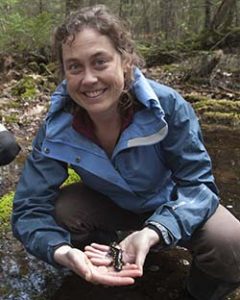Mitchell Graduate Calls Collaborative Science Research “the Wave of the Future”
 Her doctoral research concentration may have been the life cycle of juvenile frogs and salamanders, but Britt Cline’s research ended up involving an awful lot of humans, many of them far outside the world of biology: social scientists, economists, community members and elected officials.
Her doctoral research concentration may have been the life cycle of juvenile frogs and salamanders, but Britt Cline’s research ended up involving an awful lot of humans, many of them far outside the world of biology: social scientists, economists, community members and elected officials.
And she’s convinced that’s the way of the future.
“I sincerely believe that our ‘knowledge-through-action’ framework provides the vital structure for investigating rigorous questions in conservation ecology,” Cline said. “Our work requires both collaboration with and accountability to policy makers and citizens in Maine who are working to develop viable natural resource. I believe that Maine’s identity is integrally connected to the health, function, structure, and beauty of its natural resources.”
During her time as a doctoral student at UMaine’s Sustainability Solutions Initiative, now the Mitchell Center for Sustainability Solutions, Cline worked with the Vernal Pools team identifying the links between land use and amphibian habitat. The sustainability science-focused research involved innovative solutions born of multidisciplinary collaboration, such as the miniaturized amphibian tracking technology she helped develop with computer and electrical engineers.
Her work with stakeholders outside academia took her beyond research and policy development into the realm of individual outreach. She mentored with high school students interested in biological fields.
Cline has just accepted position as a postdoctoral research fellow with the University of Delaware as part of the Saltmarsh Habitat & Avian Research Program (SHARP). In this position, she will assess saltmarsh community integrity along the entire East Coast, a project that is in direct response to global sea level rise and in the wake of Hurricane Sandy. She will also work to develop an avian community integrity index, coordinating with the National Park Service and U.S. Geological Survey to develop saltmarsh-monitoring tools.
Cline’s advisor was Mac Hunter, Professor in the Department of Wildlife, Fisheries & Conservation Biology.
